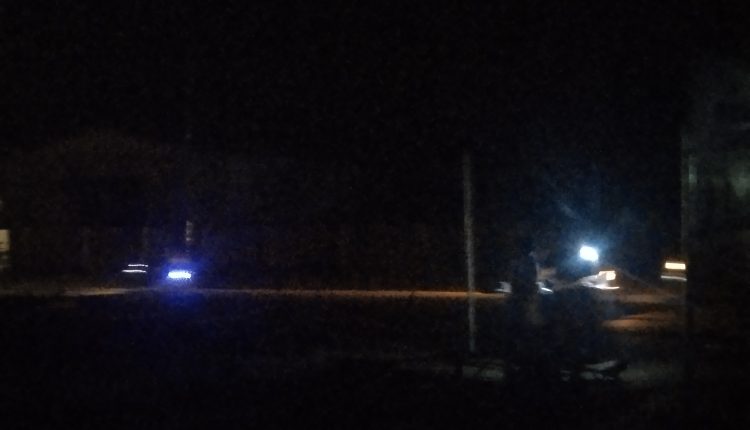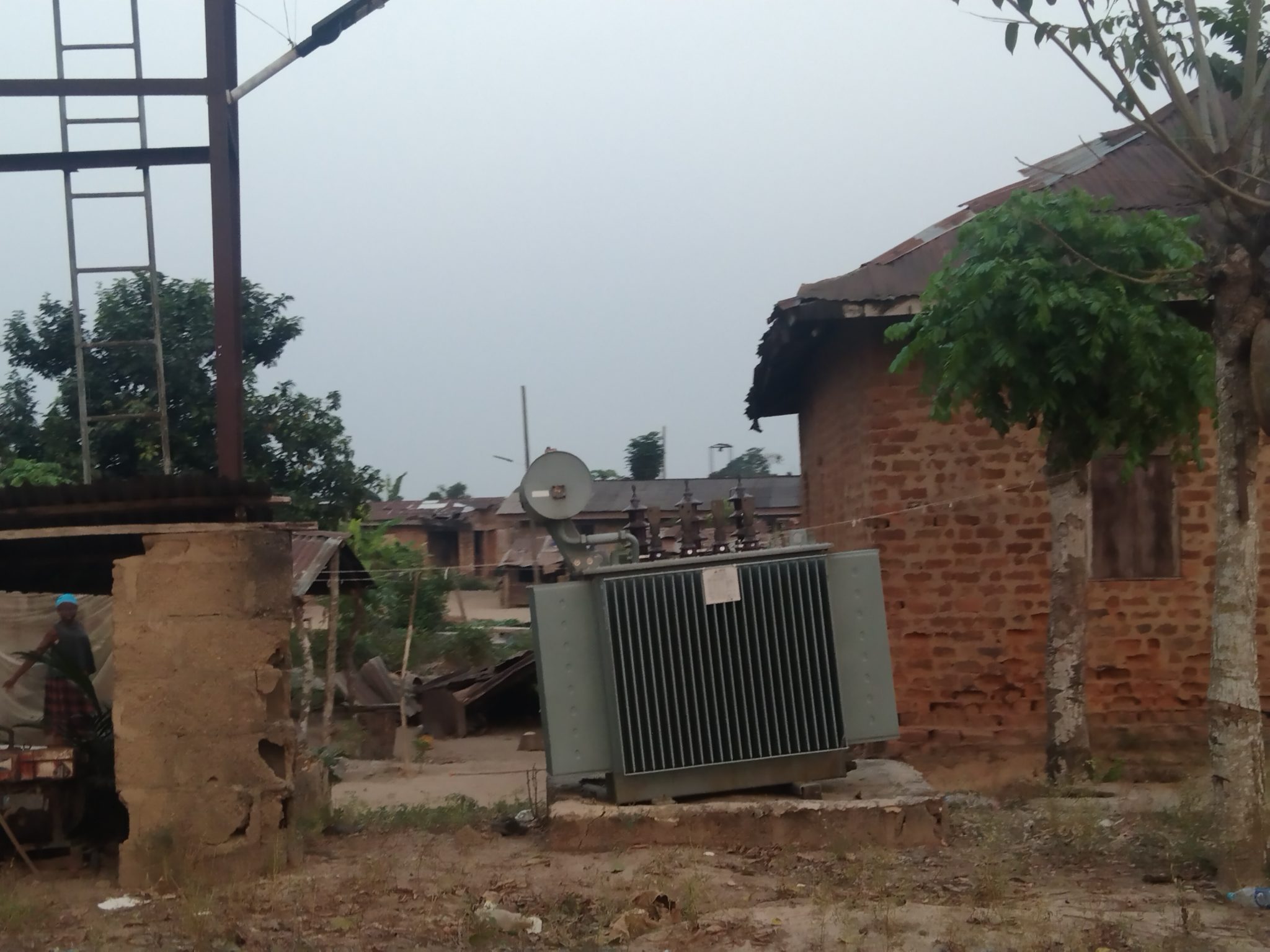Five years ago, when Alfa Ibrahim first experienced the glow off the Light-Up Oyo project which is aimed at installing streetlights on major roads in the state—his generator and torchlight went on vacation.
Each night, he enjoyed rapid sales as the streetlights illuminated his doughnut stand in Sango, attracting customers. But now, the story has changed. The Light-Up Oyo project has plunged into perpetual darkness in several communities.
Governor Seyi Makinde of Oyo State had once said the project would make the state have 24-hour running restaurants. This is contestable as fast-food traders like Alfa Ibrahim, who heavily depend on the streetlights, struggle with devastation every night.
Alfa Ibrahim generator is back in use, but the soaring cost of fuel has rendered it unsustainable.
The streetlight project, which the state government claimed operates on a tribrid power system consisting of the Oyo State 11MW Independent Power Project (IPP), gas generators, and inverters, relied heavily on diesel from its inception.
Critics argue that the reliance on diesel has led to excessive and unnecessary spending. In response, the state government defended the decision, stating through its official feedback channel on X in October 2022 that: “The streetlights already installed are of better quality and give superior illumination compared to solar-powered alternatives. Our long-term plan is to transition from diesel/inverter to gas/inverter and eventually to the Oyo State IPP, which is expected to become operational next year.” But this is not the reality years later.

Widespread Darkness
Barely three years after the streetlights’ installation, outages began affecting major communities. Initially, these issues were resolved promptly, but since March 2024, reports of persistent darkness have emerged from key areas like Ogbomoso, Iseyin, Oyo Town, and Ibadan, despite the launch of the state’s 5MW IPP.
PIJAlance’s Research and Investigations Desk (RID) Team conducted nighttime assessments across these locations and uncovered a troubling reality: darkness prevails where the streetlights once shone brightly.
In Ibadan, Mr. Femi, an electronics trader in Sango, confirmed to Nusiroh Shuaib, a PIJAlance editorial member, that the streetlights were functional when first installed. However, they have been non-functional since October 2024, leaving the area in darkness. While Mr Femi attributed the failure of the streetlights to have started in October, two pepper sellers, Mrs Abigail and Mrs Roseline (pseudonyms), along the same axis told PIJAlance’s Shuaib that the lights had ceased working as far back as March, expressing frustration over the prolonged outage.
In Agbowo, Ibadan, a vendor blamed ongoing gutter construction for the lights’ failure, while in Ogbomoso, Iseyin, and Oyo Town, residents shared similar grievances. A source in Ogbomoso claimed that the streetlights are switched on intermittently. Areas like Sabo, LAUTECH, and Under G in Ogbomoso remain having their streets engulfed in darkness every night.
Human Costs of Darkness
The lack of functional streetlights has had deadly consequences. Last month, a tragic accident occurred on the Ogbomoso-Ilorin road when a trailer crushed a widow and her two children, aged 13 and 10.
A cyclist, Kunle Fadipe, attributed the accident to both poor road conditions and the absence of functional streetlights. According to him, the trailer driver, probably unfamiliar with the terrain, failed to see a pothole in time, resulting in the fatal collision in the process of swerving to the other side of the road to avoid potholes.
“We know the road is not good but had the streetlights been operational, the driver would have spotted the pothole earlier and avoided the accident,” Fadipe told PIJAlance tearfully.
Tragically, the deceased widow’s husband was just crushed to death in August along the same axis.
Beyond accidents, the outages of streetlights have also crippled local businesses and created opportunities for crime. Students from LAUTECH in Ogbomoso recounted their experiences to PIJAlance on how they narrowly escaped a potential attack while trekking back from night classes in darkened streets. “If the streetlights were working, we would’ve seen the person from afar,” one student said.
The Light-Up Oyo Project
Initially launched as Light-Up Ibadan, the project was rebranded to Light-Up Oyo after criticism. It consists of two phases, both awarded to LedCo Allied Enterprises.
Phase one of the project was awarded in September 2019 for ₦1.77 billion, covering major roads in Ibadan. Phase two kicked off almost immediately in 2020 and was awarded ₦28.36 billion, extending to 223.48 kilometres of roads across the state.
Surprisingly, these contracts were re-awarded at the same sums, bringing the total project cost to over ₦60 billion. This amount excludes payments made to Elektron Energy for the development of the state’s 11MW IPP, which was partly intended to also power the streetlights alongside other government-centred infrastructures.
During the Phase Two inauguration of the project in September 2020, Governor Seyi Makinde emphasized that the project would be financed through a contractor’s project financing scheme, with the state government contributing an initial ₦2.8 billion counterpart funding. He projected that the project would be completed within nine months and the reimbursement of the contractor would be done at every 50 kilometres completed.
Despite these promises, the project has largely failed to deliver. It is poorly managed, leaving it constantly inoperable across communities in the state.

‘Nonfunctioning Streetlights started when you observed them’ said the Contractor’s Media Officer
PIJAlance reached out to Fatimah Odunowo, Executive Director of LedCo Allied Enterprises, for comments. Despite multiple calls, she did not respond until a message was sent to her on WhatsApp on Friday at exactly 11.22am.
She responded barely two hours later to say LedCo Media Officer would revert to our team.

By 5.53pm, a number called our team with the interlocutor at the other end, saying he was Anthony Fatokun, media officer of LedCo.
Our team interviewed Fatokun on the epileptic operations of the project and here is what he has to say: “It is because we’re doing some upgrades on some of the installations, so we’re carrying out some upgrades at the moment. So it is more like a technical glitch which we’re working on, we’re upgrading the system. So by the time we’re done, hopefully, within the shortest possible time, the light would be back.”
When asked further about when the technical glitch started, Fatokun defiantly said, “Since the time that you observed that they were off.”

Discrepancies with Contractor’s Bidding Documents
In Nigeria’s Procurement Law (2007) and Oyo State Procurement Law (2010), awarding contracts to contractors who have companies that are not primarily registered with the Corporate Affairs Commission (CAC) is unlawful. The laws prioritize all contractors bidding for government projects to have a bidding company registered with CAC and have the following documents backed by their registration certificate: Receipt of Payment, Company’s Income Tax Clearance, Personal Income Tax Clearance, VAT Registration Certificate, Company Profile with Resume and Government ID of Key Personnel Memorandum & Articles of Association, Evidence of previously executed projects, Bank Reference Letter, Company’s 3-Year Financial Summary.
Despite these, LedCo Allied Enterprises was not registered with CAC when the Oyo State Government awarded the first contract in 2019 as shown in the image above (retrieved from CAC).
By default, if a company is not registered with the CAC, it would be difficult to get the company tax payment certificates, much less of a 3-year company’s financial summary. This means LedCo Allied Enterprises did not possess any of the “Company’s Income Tax Clearance, Personal Income Tax Clearance, VAT Registration Certificate,” expected by law before it got the contract of ₦1.77 billion in 2019.
On CAC, the contractor was only registered as LedCo Limited when it got a contract with LedCo Allied Enterprises in 2019. Interestingly, data retrieved via the procurement portal of Oyo State, revealed that Oyo Government awarded the same project to the same company with different names in 2019 and 2020.
To add context, LedCo Limited, which was registered in 2018, was awarded a ₦1.77 billion contract to commence the light-Up Oyo Project Phase One on September 05, 2019. Same date, LedCo Allied Enterprises, unregistered with CAC, was also awarded the same ₦1.77 billion to commence the light-Up Oyo project.
This process was repeated on May 11 and August 12, 2020, with a ₦28 billion contract separately awarded to both LedCo Allied Enterprises and LedCo Limited for light-Up Oyo Project phase two.




LedCo Allied Enterprises was just registered 46 days when it was awarded the August 12, 2020 contract of ₦28 billion.
In a chat with the Media Officer of LedCo, Fatokun said “Let me clarify this (referring to the contract of May 11, 2020). This contract with LEDCo Limited was cancelled and reawarded to LEDCo Allied Enterprises. This explains why it appears awarded twice.”
Fatokun’s statement inferred that the Oyo State Government probably erred twice while awarding contracts to LedCo. This is, however, unexpected for a government.
Attempt to reach the State Government for comments were proven futile. A Special Assistant to the Governor on Project Delivery, Hon. Abiodun Oluwaseun contacted has yet to respond to PIJAlance message as of the time of filing this report.
This investigation is supported by PIJA Foundation under its Grassroots Development and Investigations Project (GDIP)







Leave a Reply